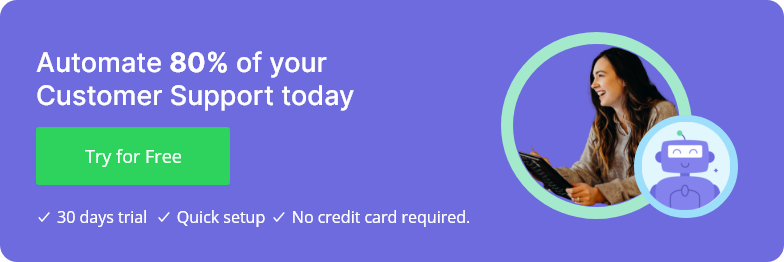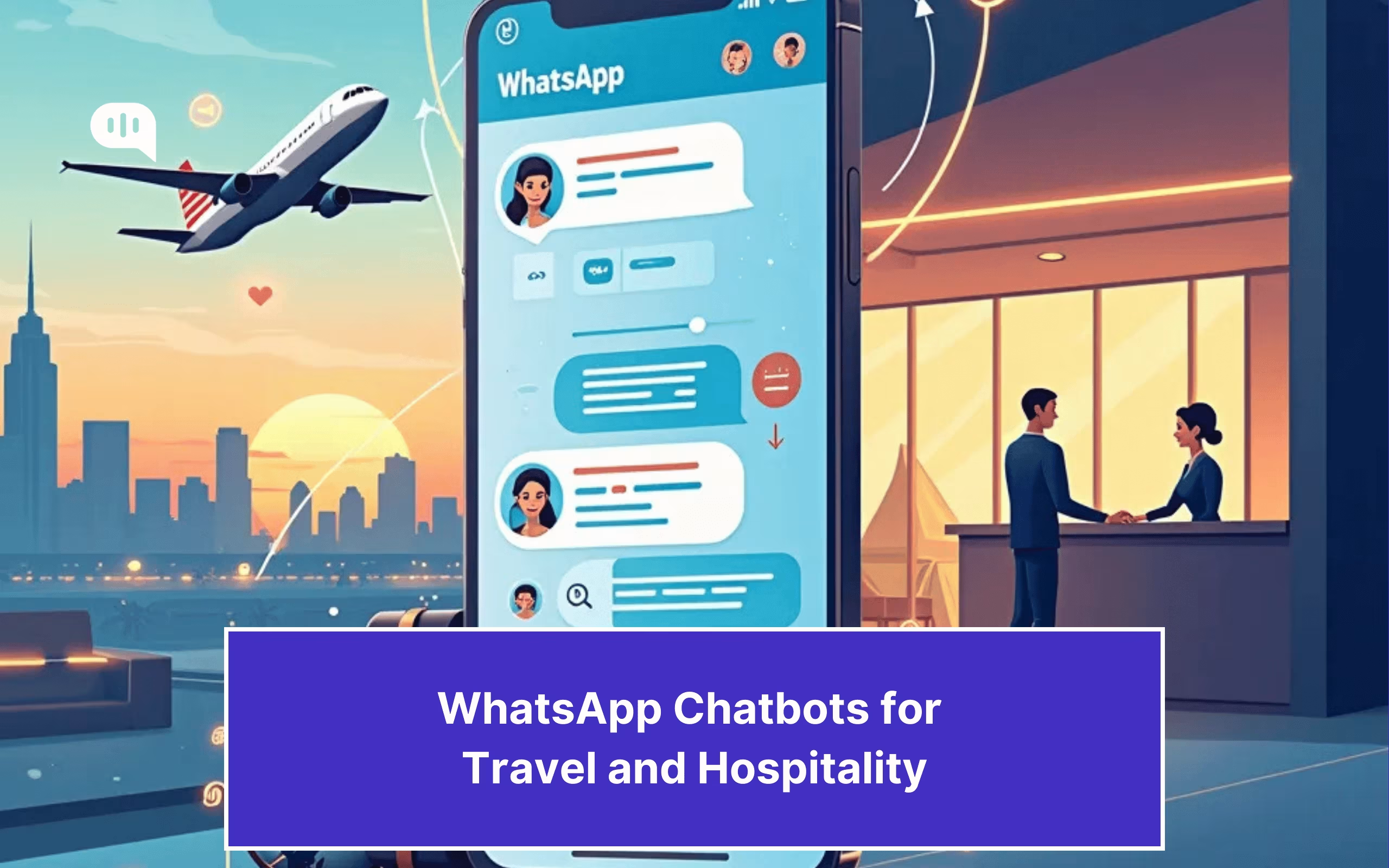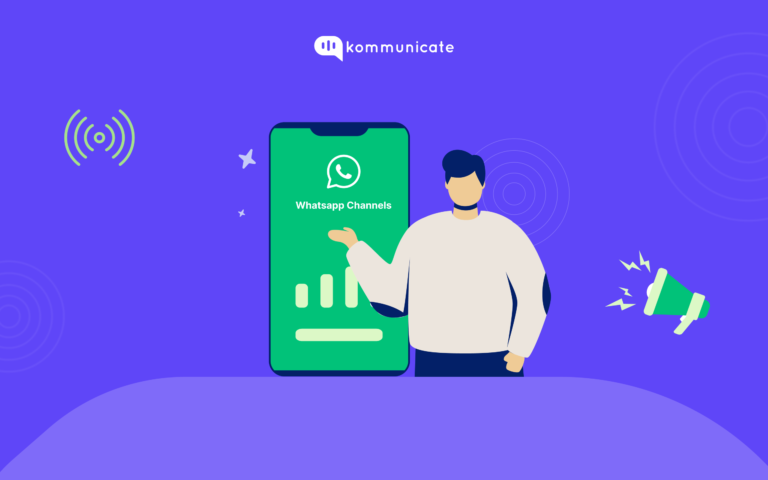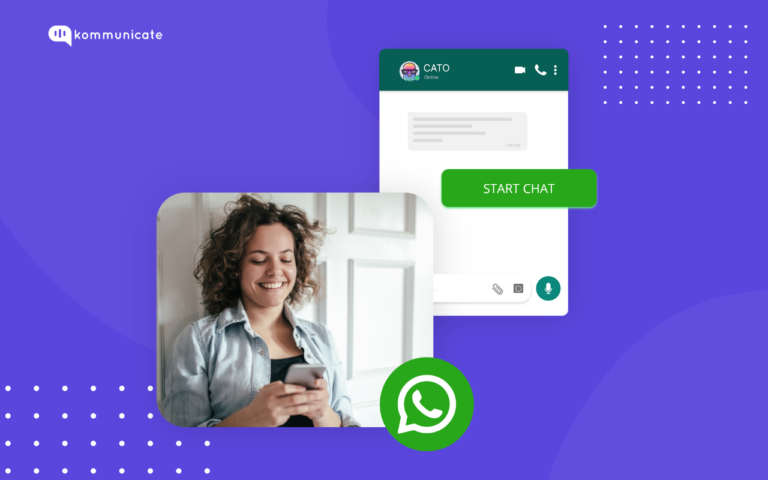Updated on April 8, 2025
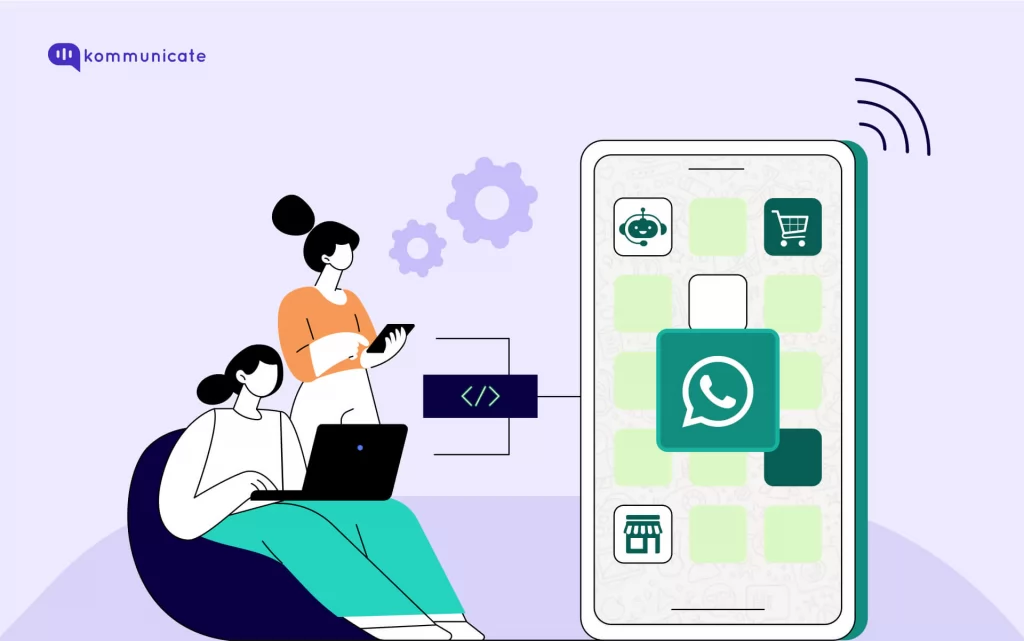
WhatsApp currently has 2.78 billion users worldwide, according to this report. There were nearly 292 million WhatsApp Business downloads in India until June 2022.
With numbers as impressive as these, it is important to know everything there is about WhatsApp Business API.
This is where we come in. In this blog post, we are going to teach you everything about WhatsApp Business API, so that you don’t have to go looking anywhere else for information.
In this article:
- What is WhatsApp Business API?
- WhatsApp vs. WhatsApp Business vs. WhatsApp Business API
- WhatsApp Business API Pricing in 2025
- WhatsApp’s conversation-based pricing model
- WhatsApp Business API Pricing for Countries – Cost per Conversation In USD
- How to Choose Whatsapp Business API Provider
- WhatsApp Business API billing process
- Factors that affect the WhatsApp Business API pricing
- WhatsApp Business API benefits
- How to Get a WhatsApp Business API Account
- Conclusion
- Frequently Asked Questions
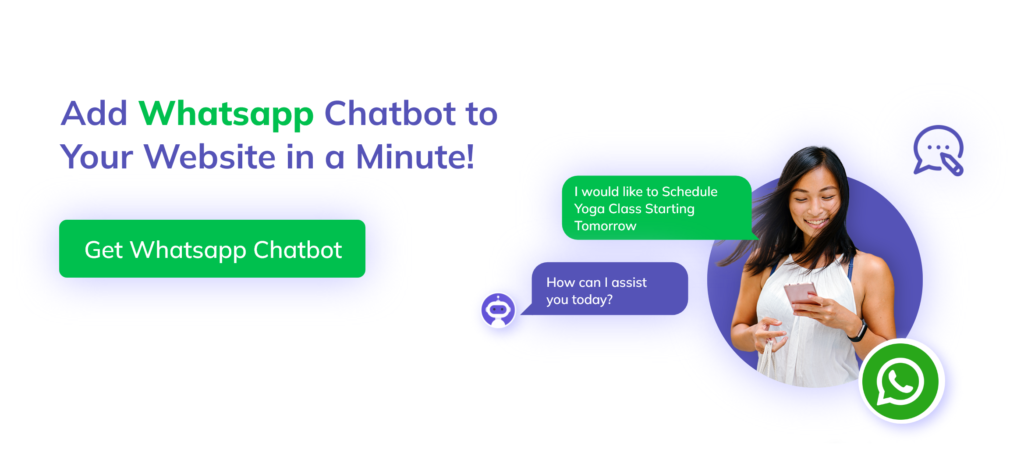
Looking for different WhatsApp integrations that you can implement to help your business grow? Check out these articles:
- How to Integrate ChatGPT with WhatsApp for Seamless Conversations
- How to Send Bulk WhatsApp Messaging with Simple Steps
- 10 WhatsApp Features You Must Know in 2025
Let’s go.
What is WhatsApp Business API?
WhatsApp Business API is a bridge between WhatsApp users and your business systems. WhatsApp Business API allows businesses to seamlessly exchange messages and interactions with their customers, much like AI-powered email ticketing systems. It can handle multiple conversations, provide automated responses, and craft personalized dialogues, creating an efficient customer service email automation system within the trusted space of WhatsApp
WhatsApp vs. WhatsApp Business vs. WhatsApp Business API
| Sl. No. | Feature | WhatsApp Business | Basic features with added business-specific options. This includes labels and catalogs. | |
| 1 | Purpose | Communicating with friends and family. | Small business communication and engaging with customers. | Large-scale business communication and automation. |
| 2 | User base | Consumers, individuals. | Small and Medium Businesses | Medium to Large Enterprises |
| 3 | Profile verification | No | Yes | Yes |
| 4 | User interface | Designed for individuals | App to be downloaded from Play Store/ app store. No additional installations. | Custom interface which is integrated with your business systems. |
| 5 | Quick replies | No | Yes | Yes |
| 6 | Automation | Limited | Basic automation in the form of quick replies and greetings | Powerful automation capabilities in the form of workflows |
| 7 | Technical requirement | App to be downloaded from Play store/ app store. No additional installations. | App download for business account. | Integration with business systems and technical expertise required. |
| 8 | Pricing | Free | Free for basic features, additional cost for premium features. | Paid subscriptions through approved partners. |
WhatsApp Business API Pricing in 2025
WhatsApp Business API doesn’t charge a direct fee for usage. It has a conversation-based pricing model, where the charges are applied based on several conversations. There is a 24-hour customer service window, which influences the way you will be charged by WhatsApp. Read on to find out more.

Typically, WhatsApp Business API has three costs associated with it:
- Messaging software costs
- BSP charges
- WhatsApp Conversation Charges
Let us explore WhatsApp Conversation Charges in detail:
WhatsApp’s conversation-based pricing model in 2025
There are two types of WhatsApp Conversations that WhatsApp has split into, based on which it will charge customers. These are
1. Service-initiated conversations
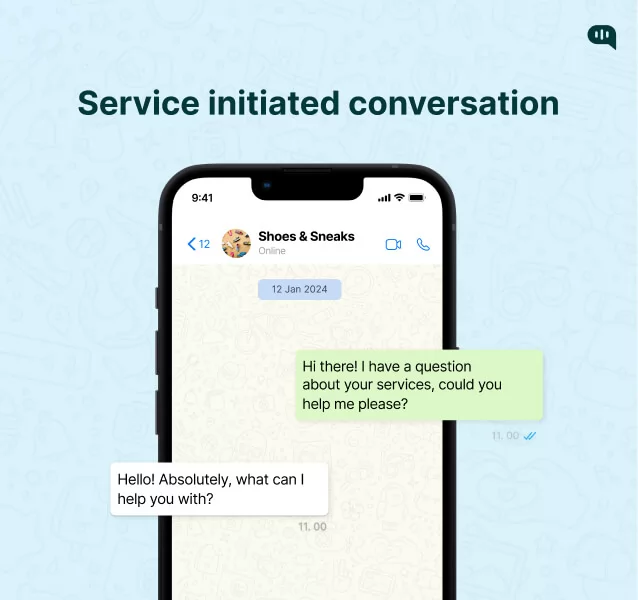
This is when the user sends the first message. If a business replies within 24 hours, then a charge is applied. Generally, user-initiated messages are charged less because WhatsApp wants people to use it as a customer support platform. User-initiated conversations are free for the first 1000 conversations.
For example, if the user is on an e-commerce website and sees a T-shirt that he would like to purchase. He has a query about the pricing for various sizes of T-shirts
2. Business-initiated conversation
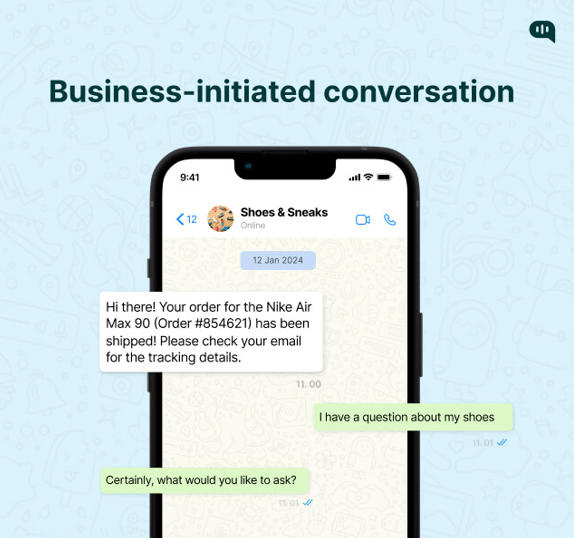
A business-initiated conversation is when a business sends the first message or continues to a user-initiated message outside the 24-hour window. In a business-initiated conversation, there are certain pre-approved messaging templates that you must use for any one of the following 3 use cases – Utility, Marketing, and Authentication.
Types of business-initiated Conversations
The new business-initiated conversation categories are:
i) Marketing
ii) Utility
iii) Authentication
i) Marketing Conversation
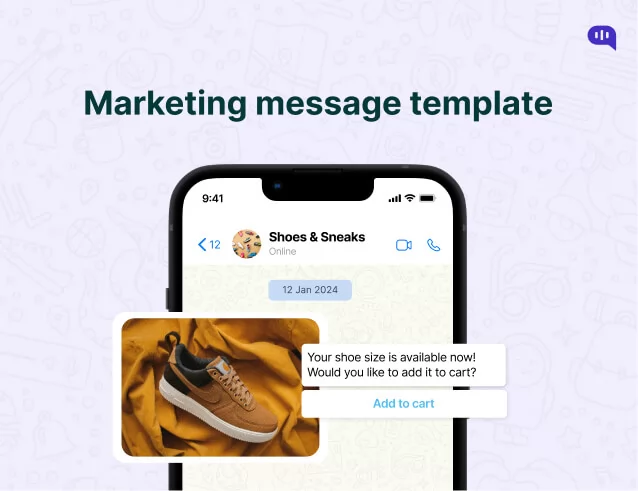
Marketing template messages are exactly what the name implies. If you want to send offers, give discounts, or inform customers about future product launches, all these come under marketing messages. Marketing messages are slightly more expensive compared to other messages because it is promotional.
ii) Utility Conversation
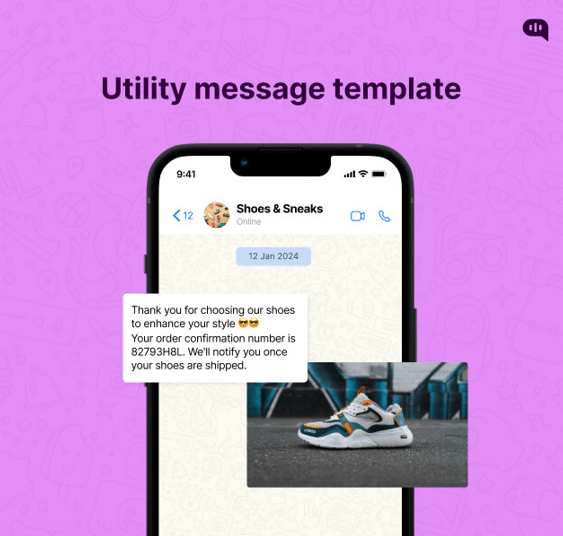
Utility messages are transaction-related messages. For example, order confirmation or shipping notifications are all utility messages. Utility messages are slightly less expensive compared to marketing template messages.
iii) Authentication Conversation
If you are using WhatsApp to send an OTP verification message, then it falls under the Authentication template message. This type of message is even more cheap compared to utility messages.
3. Customer Service Windows
A customer service window is a 24-hour window that starts as soon as the customer messages you. Within this window, you can send free-form messages or template messages, and outside this window, you can send only template messages.
4. Conversation Duration
The conversation duration for marketing, authentication, utility, and service conversations is 24 hours unless it is closed by a newly opened free entry-point conversation.
5. Multiple Conversations
You can have multiple conversations between you and the customer. The 2 situations this can happen in
Situation 1:
When an open marketing, utility, or service conversation is happening between you and the customer and you send them a template message from a different category within 24 hours.
Situation 2:
An open service conversation exists between you and the customer and you send them a template message within 24 hours.
6. Free Tier Conversations
Every WhatsApp Business Account gets 1000 free service conversations each month across all of its business phone numbers, which are refreshed at the beginning of every month, based on the WABA time zone.
7. Free Entry Point Conversations on WhatsApp Business API
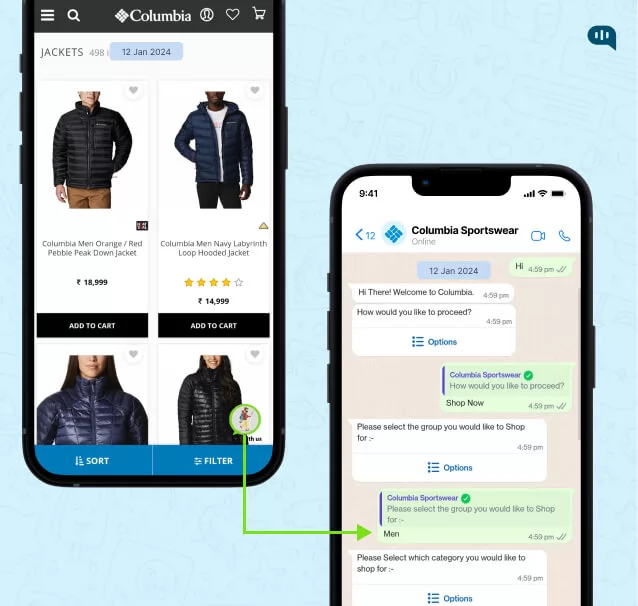
There are 2 situations where a free entry point conversation is opened.
- When a customer running on an Android or iOS device messages you via a Click to WhatsApp Ad or a Facebook Page Call-to-Action button.
- You respond within 24 hours.
WhatsApp Business API Pricing for Countries – Cost per Conversation In USD
Here is a price breakup for some of the most popular countries and how much they charge for each of these types of messages:
All prices are in USD ($)
| Sl. No. | Country | Marketing | Utility | Authentication | Service |
| 1 | USA | 0.025 | 0.015 | 0.0135 | 0.0088 |
| 2 | UK | 0.0705 | 0.0398 | 0.0358 | 0.0388 |
| 3 | Germany | 0.1365 | 0.0853 | 0.0768 | 0.0819 |
| 4 | India | 0.0099 | 0.0042 | N/A | 0.004 |
| 5 | Malaysia | 0.086 | 0.02 | 0.018 | 0.022 |
| 6 | Italy | 0.0691 | 0.042 | 0.0378 | 0.0386 |
| 7 | Canada | 0.025 | 0.015 | 0.0135 | 0.0088 |
| 8 | UAE | 0.034 | 0.0198 | 0.0178 | 0.019 |
| 9 | Singapore | 0.0732 | 0.0472 | 0.0425 | 0.0224 |
For more pricing details, refer to Meta’s pricing page here.
Choose Whatsapp Business API Provider
Each Business API provider has their service pricing. Here are the rates charged by some of the most popular WhatsApp Business Solution Providers:
| WhatsApp Business API provider | Twilio | 360Dialog | Sleekflow |
| Price (USD) | $0.005/message | $5-$25/message | $15/month |
All the pricing above does not include the conversation price required by Meta.
Let us now explore how the billing process works for WhatsApp Business API.
WhatsApp Business API Billing Process
In this section, we are going to teach you how to view payments and also understand how invoices work. When creating a WABA, you must also apply for a line of credit. Once this application is approved, WhatsApp will show a “monthly invoice” in the Payment Settings section within your WhatsApp Business Manager.
This invoice, which includes all the spending associated with the same WhatsApp Business Manager will be emailed to users during the first week of each month. The payments can be completed by transfer to the Facebook bank account which is listed on each invoice.
Please note that fees should be paid within 30 days following the invoice date, to avoid late payment charges.
Factors that affect the WhatsApp Business API pricing
Here are a few factors that influence how much you spend every month on WhatsApp Business API:
1. Country/origin point
For user-initiated or business-initiated conversations, the pricing depends on the country in which your business is located. We have highlighted the pricing for some of the countries in the table above, and for a detailed list, you can follow Meta’s pricing link..
2. Use case
The WhatsApp Business API pricing varies based on the use case since marketing, sales and customer service teams use a certain conversation category.
Marketing conversations are the most expensive because marketing teams use WhatsApp to broadcast promotional messages, updates, and CTAs. This means sending bulk messages to promote your business will now become expensive.
Sales conversations come with the primary goal of nurturing leads and winning sales. Use WhatsApp Business API only if your business has a high-profit margin per sale.
The last use case is supported, for which WhatsApp says that “Service conversations help resolve customer inquiries.” Customer inquiries must be responded to promptly, which can be achieved within the 24-hour service window. Service conversations are thus best for support teams, who can send an unlimited number of messages to customers to resolve their queries.
3. Business Solution Provider
Since WhatsApp Business API does not have a front-end interface, you will need to use a CRM or a Business Solution Provider (BSP). WhatsApp BSP generally has its pricing models, and it includes 2 components:
- WhatsApp Business API fees
- Monthly subscription fees
In addition to WhatsApp conversation charges, additional fees imposed by BSPs include
- Markup per message: Similar to SMS, you pay for each message sent or received via the WhatsApp Business API.
- Markup per conversation: Here the billing happens on the number of conversations you have with the customer.
- Flat fee: Here, you pay a fixed flat fee irrespective of the number of messages or conversations.
- Setup fee: Providers can incorporate a one-time setup fee on top of WhatsApp conversation charges.
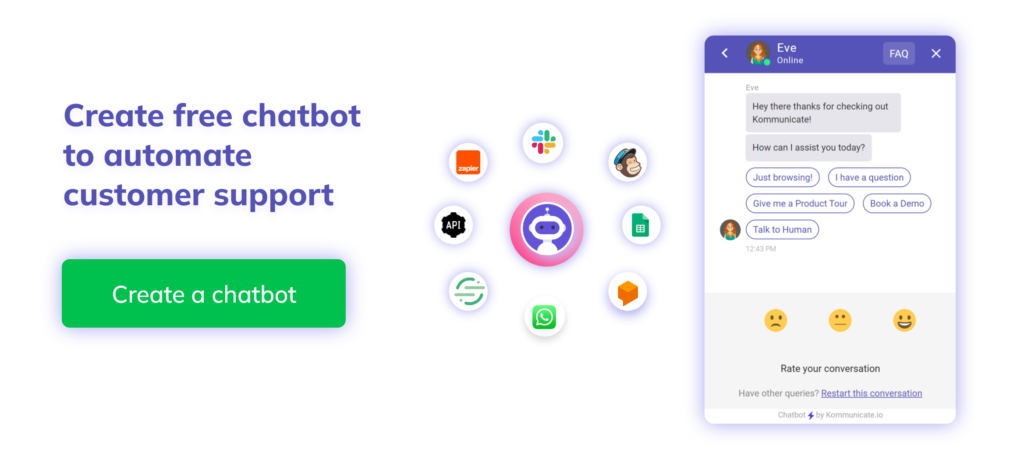
Benefits of WhatsApp Business API
Here are some of the benefits of using WhatsApp Business API
- Rich media support: With WhatsApp, you can send a wide range of media types, which includes images, videos, pdf, and also location pins. This means that you can communicate with your customers more engagingly.
- End-to-end encryption: WhatsApp messages are encrypted end-to-end, meaning your business communication is always secure and private.
- Automated responses: With WhatsApp Business API, you can enable automated responses, meaning your customers get instant responses to some of their most common queries. Businesses can be available to customers even after regular business hours, meaning improved customer satisfaction.
- 24/7 Availability: WhatsApp Business API makes your business accessible to customers around the clock, improving the overall customer experience—no more missed customer queries.
- Integration options: You can integrate WhatsApp Business API into a wide array of third-party tools and software. Businesses can streamline their workflows, making their operations more efficient.
How to Get a WhatsApp Business API Account
As of today, you cannot buy an API key directly from WhatsApp, and you need to split your spending between WhatsApp (Conversation fee) and a WhatsApp partner who will provide you the API along with the software or the interface to chat.
Read this blog for more information: How to Create a WhatsApp Business Account
Conclusion
As you can see, WhatsApp Business API is not just another tool, it is a bridge that connects you to your customers on a platform they love. The key to success here lies in your approach to how you use it. Understand what your audience wants, make sure you use the API’s various features and choose a pricing that suits your needs.
Frequently Asked Questions (FAQs)
1. How does WhatsApp Business API work?
The first step is the business getting an API account, which requires approval from WhatsApp through a Business Solution Provider (BSP). The API is then connected to your business system, where it integrates with your CRM or helpdesk through programming. Customers then start messaging your business, and the API processes and delivers these messages to your system. You can also use the API to send automated or manual responses through your system.
2. Is the WhatsApp API free?
WhatsApp Business API in itself is free to access. However, you need to pay a Business Solution Provider (BSP) to connect and manage the API, who will charge you a monthly fee. We have mentioned some of the BSPs and their charges in the table above. The total cost for the WhatsApp Business API will depend on the message volume, chosen BSP, and any additional feature that you may use.
3. How can I use WhatsApp API directly?
You cannot use the WhatsApp Business API directly at this point as a business, due to security issues and because setting up and managing the API requires technical expertise.
4. Can you call on WhatsApp Business API?
The WhatsApp Business API is a business API, without a front-end interface or an app. The voice calling feature in itself is not a standalone feature of the WhatsApp business API.
If you need to do a voice call or a video call, you may need to use the WhatsApp app itself.
5. Is WhatsApp Business API available for everyone?
The WhatsApp Business API cannot be used directly, and you need to partner with a Business Solution Provider (BSP) to use all the features of the API. Thus, it is not regularly available to everyone, unlike the WhatsApp App.
6. How long does it take to get WhatsApp Business API?
The time range to get a WhatsApp Business API falls between 3 days to 4 weeks. Several factors contribute to this time, including partnering with a BSP, the WhatsApp approval process, Account setup, and integration time.

